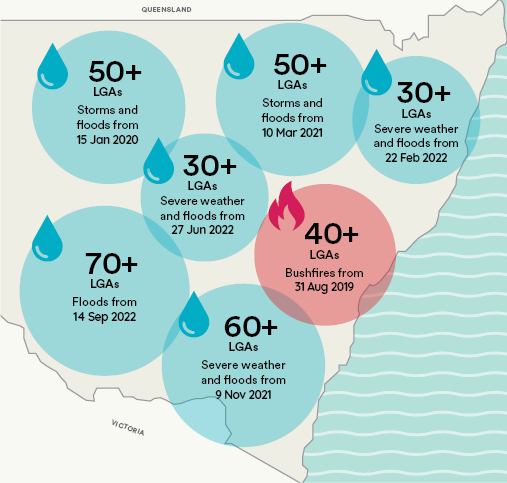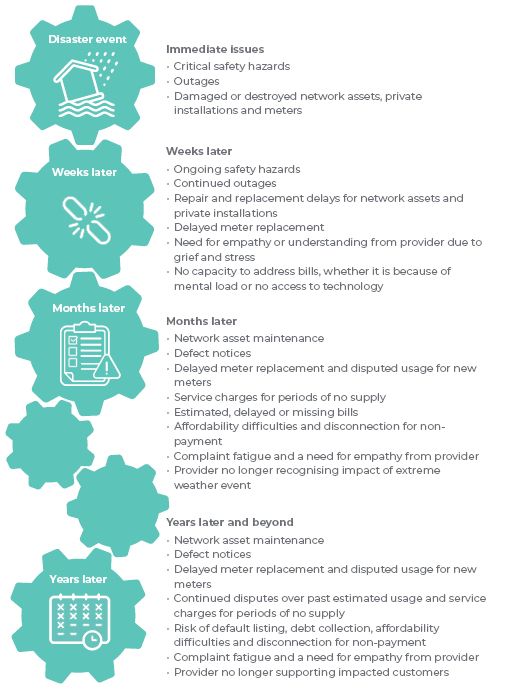-
Home
-
Publications and submissions
-
Reports
-
Spotlight On
- Natural disasters - the long-term customer experience
Natural disasters - the long-term customer experience

November 2023
“[W]hat was unprecedented is now our future.” - Royal Commission into National Natural Disaster Arrangements Report
Every Local Government Area (LGA) in NSW has been included in a flood or bushfire disaster declaration at least once between July 2018 and October 2023.
The immediate response to these events is extensive, garnering a combined reaction from the community, industry, and policy makers to find quick and effective solutions to ensure the safety of the community. But what happens to the support offered to residents and small businesses in the months and even years that follow?
EWON is not a first responder after a natural disaster. We handle complaints from customers after the immediate safety hazards have been addressed. Customers come to us when they are experiencing ongoing and long-term billing, supply and affordability issues, often months or even years after their homes or businesses were destroyed or deemed uninhabitable.
In this Spotlight On report, we focus on the energy complaints EWON receives, relating to the bushfires and floods declared as disasters by the NSW Government in the past five years. The case studies describe the trauma customers experience when trying to manage energy disputes, leading to confusion, stress, financial disadvantage, and preventable complaint fatigue.
With every part of NSW touched by extreme weather events, and many areas heavily and repeatedly affected, it is crucial to understand and address the long-term impact on residential and small business energy consumers.
EWON is calling for the energy industry to address the continuing issues customers face after natural disasters before the next event occurs, and even more customers are left facing long-term barriers accessing essential services.
The below map shows NSW flood and bushfire disaster declarations with the most widespread geographical impact, all striking at least 30 LGA's across multiple regions. Many areas were impacted repeatedly. Lismore, for example, was included in six of the seven disaster declarations highlighted in the map.

How does EWON help after bushfires and floods?
Extreme weather events have an immediate and catastrophic impact, followed by a long tail of complicated impacts on individuals, local and surrounding communities. Reports like the Thriving Communities Partnership Disaster Planning and Recovery Project and The Energy Charter Disaster Response Playbook detail these impacts.
EWON is not a first or even second responder; we are primarily a long-term responder. Safety and wellbeing are paramount in the initial response and recovery period. Immediately following a disaster, the majority of energy issues are urgent matters like safety hazards, damage, outages, and access to other essential services like telecommunications and transport. When customers contact us about these issues, our role is to provide clear information and refer them for immediate assistance. Our ‘no wrong door’ approach sees us share electricity networks’ advice about their on-the-ground safety operations and restoration activities, we post social media updates and connect customers to first responders.
Over time, people regain time, capacity and access to technology to seek our help. EWON then has an active role handling complaints from people who are experiencing longer-term consequences of events, like billing disputes, replacing meters and seeking affordability support.
EWON’s outreach team then prioritises visiting impacted areas to provide support. EWON carefully considers the timing of outreach events to raise awareness about our services and provide an opportunity to seek our help in person. For example, following catastrophic floods in Forbes in November 2022, EWON engaged with the community about the right time to visit, waiting until July 2023 to hold a Community Assist Day in the area. Hear one Forbes residents' story here. EWON has also delivered post-crisis event outreach in Lismore and the Hawkesbury.
In addition to the profound, disruptive and sometimes tragic impacts of an extreme weather event, an event that took only a few hours to change a person’s life can affect them in different ways for years to come.

Long-term support for energy customers
“It’s anxiety-inducing, it really is. […] When I do ring and say, look, this is what the story is and this is what’s happened, nearly always they would say we’ll investigate and get back to you, and all that happens is that I get another bill. And it just sort of goes on and on.” Lismore resident, Channel Nine Today Show interview
Our complaints tell us that while people continue to experience long-term consequences following an extreme weather event, targeted energy provider support reduces.
Provider understanding and empathy can wane as the years pass and memories of the event in that area are forgotten. Other extreme weather events occur and capture public attention. Expectations about adequate support and what is fair and reasonable for a customer impacted by an extreme weather event become less clear. This leads to inconsistent experiences for customers, many of whom are experiencing ongoing deep vulnerability.
Industry expectations
After the widespread and devastating floods that occurred from mid-February 2022, the Australian Energy Regulator (AER) wrote to energy providers operating in NSW and Queensland in March 2022. It urged them to provide additional assistance to customers affected by floods, encouraging actions including:
- not disconnecting any residential or small business customers who may be in financial stress due to the floods
- not charging daily supply charges for periods of no supply due to the floods
- deferring referrals of residential and small business consumers to debt collection agencies for recovery actions or credit default listing
- waiving disconnection, reconnection and contract break fees for small businesses that have ceased operation.
The AER asked EWON to monitor and report on any potential compliance issues with these expectations for a period of six weeks, during which we received no reportable complaints. There was no specific end date or timeframe put on the encouraged actions. This meant there was nothing stopping energy providers continuing these or similar actions in the long-term, or proactively going above and beyond. But there was also no formal industry expectation to provide continued support beyond six weeks.
EWON is still taking complaints from customers whose homes and lives were devastated, nearly two years following this event. Our complaints show that while some energy providers have continued to offer the kind of understanding and support outlined in the AER’s expectations, many others have not.
Complaint insights
The following case studies illustrate many of the energy issues customers experience and raise with EWON in the months and years after an extreme weather event. They also highlight the difficulties customers face trying to resolve complaints in the long-term. Additional case studies are also available in our July to September quarterly EWON Insights report.
 Displaced customers and continued billing issues
Displaced customers and continued billing issues
Extreme weather events lead to people being displaced from their home or business. Other homes and businesses are severely damaged or destroyed, and it can take months or years for people to start rebuilding.
Customers are generally liable for fixed daily service charges even during periods when they are not using energy. Given the exceptional circumstances of an extreme weather event, energy networks and/or retailers will frequently not charge fixed daily service charges for impacted periods – but there is not a formal requirement for them to do this.
Customers are also usually liable to pay estimated bills where an energy provider has not reasonably been able to base the bill on an actual reading. However, if the customer receives an estimated bill in the wake of an extreme weather event, the situation is often more complicated. EWON received complaints where:
- the customer’s estimate usage is based on the same time the year before, but the customer’s circumstances are dramatically different due to the extreme weather event
- the customer receives bills with estimated usage for periods when they were not able to live in the property and not using energy
- the customer receives bills with estimated usage for periods when the meter was damaged or destroyed.
Case study one: Estimated bills for destroyed property
 Meter replacement delays
Meter replacement delays
EWON receives complaints where customers experience extensive delays by retailers arranging to replace their damaged or destroyed meters, after they receive notice from the network that they have a faulty meter. This can be due to internal process issues between retailers and metering providers, lack of metering provider technician availability or a lack of understanding that the problems with the existing meter stem from an extreme weather event. In some instances, customers are not aware there is a continued issue with their meter until they query their bills.
Case study two: Flood damaged meter leads to estimated bills
 Collections activity for unpaid bills
Collections activity for unpaid bills
EWON receives complaints where customers experience extensive delays by retailers arranging to replace their damaged or destroyed
Customers may continue to experience financial difficulties for years following an extreme weather event. Receiving debt collection notices, phone calls and text messages for unpaid bills and accumulated debt can be an enormous source of stress. Many customers are subject to collections activity related to multiple utilities and services. For active accounts, collection activity complaints to EWON include:
- receiving extensive collections contact like requests for payment via phone and email
- difficulty negotiating a payment arrangement with a provider or accessing affordability assistance
- risk of disconnection for non-payment.
For closed accounts, collection activity issues include referral or sale of debt to third party mercantile agents and risk of credit default listing.
Case study three: Small business disconnected during flood repairs
Case study four: Payment reminders and complaint fatigue
 Network and private installation issues
Network and private installation issues
EWON receives complaints about ongoing network and private installation issues, including:
- delays repairing or replacing network assets
- changes to minimum standards for safety maintenance, such as customers needing to comply with stricter vegetation management requirements
- defect notices for private installations related to damage or destruction from extreme weather events
- problems with work completed when restoring or rebuilding a property following an extreme weather event.
Case study five: Post-bushfire hazard reduction by network
Case study six: Solar panels and high bills after bushfires
 Lack of provider empathy and understanding
Lack of provider empathy and understanding
Many of the complaints we receive demonstrate customer frustration with a lack of provider empathy and understanding. In particular, customers express to EWON how stressful and upsetting it is to have to repeatedly explain themselves to providers, often reliving very traumatic experiences. This is one of many factors that can lead to a lack of confidence in the energy sector and, ultimately, complaint fatigue, where customers no longer have the capacity to continue pursuing a complaint.
Case study seven: Customer traumatised by retelling story
.jpg) Calls to action
Calls to action
To support customers beyond the initial safety and access issues following a natural disaster, EWON is calling for the energy industry to take steps now, before the next natural disaster hits and more customers are left facing long-term issues accessing essential services. We’re calling for:
- Long-term support plans
Regulators, industry bodies and energy providers need to plan long-term to support customers impacted by extreme weather events. This planning needs to be informed by an understanding that impacts continue for years after the event, that people may experience multiple events and how the nature and level of impact changes over time.
- Address factors contributing to customer stress, dissatisfaction, and lack of confidence in the energy sector culminating in complaint fatigue
Energy providers need to use insights from internal and external complaints to identify ways to foster better understanding of the impact of extreme weather events and avoid complaint fatigue in customers. While providers often get it right, the case studies in this report demonstrate that complaints are an invaluable source of insights about where things need to be done better.
- Engage with us
EWON will continue this conversation within the energy sector, and beyond, to share the insights from our complaints. Our complaints tell us about customer experiences with energy issues after extreme weather events – we all need to understand and remember that energy issues are part of a complex array of impacts on affected customers.
To talk to us about this issue contact policy@ewon.com.au. For media queries contact Jacqueline Heywood. Don't want to miss future editions? Subscribe to Spotlight On.

